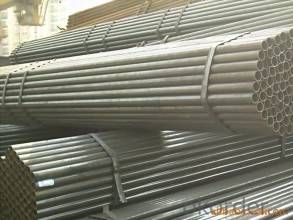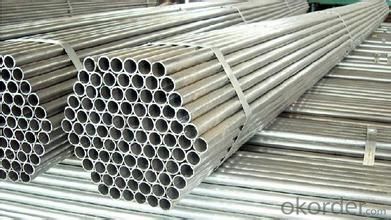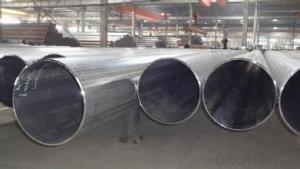A Aariety of High-frequency Welded Pipe ERW Utility
- Loading Port:
- China main port
- Payment Terms:
- TT or LC
- Min Order Qty:
- 10 m.t.
- Supply Capability:
- 5000 m.t./month
OKorder Service Pledge
OKorder Financial Service
You Might Also Like
Product Description:
It is widely applied to line pipe and casing and tubing in oil transportation and casing field, and it is used in Low,high pressure liquid and gassy transportation and it is also good Structure pipe (for furniture, window, door, building , bridge, mechanical etc).
Standard of ERW Welded Pipes: API SPEC 5L, API SPEC 5CT, ASTM A53, GB/T9711.1
Steel Grade of ERW Welded Pipes:API SPEC 5L: B, X42, X46, X52, X56, X60, X65
API SPEC 5CT: J55, K55, N80, L80-1
ASTM A53: A, B, C
GB/T9711.1:L242、L290、L320、L360、L390、L415、L450
Sizes of ERW Welded Pipes:
Standard: GB/9711.1
Mechanical Properties
Remark: Besides below sizes, we also can arrange production based on requirement of customers
OD | WT | WEIGHT | ||||
INCH | MM | SCH | MM | INCH | KG/M | LB/INCH |
1 1/2” | 48.3 | STD-40 | 3.68 | 0.145 | 4.09 | 2.75 |
1 1/2” | 48.3 | XS-80 | 5.08 | 0.2 | 5.47 | 3.68 |
2” | 60.3 | STD-40 | 3.91 | 0.154 | 5.49 | 3.69 |
2” | 60.3 | XS-80 | 5.54 | 0.218 | 7.56 | 5.08 |
2 1/2” | 73 | STD-40 | 5.16 | 0.203 | 8.72 | 5.86 |
2 1/2” | 73 | XS-80 | 7.01 | 0.276 | 11.52 | 7.74 |
3” | 88.9 | STD-40 | 5.49 | 0.216 | 11.41 | 7.67 |
3” | 88.9 | XS-80 | 7.62 | 0.3 | 15.43 | 10.37 |
3 1/2” | 101.6 | STD-40 | 5.74 | 0.226 | 13.71 | 9.21 |
3 1/2” | 101.6 | XS-80 | 8.08 | 0.318 | 18.83 | 12.65 |
4” | 114.3 | STD-40 | 6.02 | 0.237 | 16.24 | 10.91 |
4” | 114.3 | XS-80 | 8.56 | 0.337 | 22.55 | 15.15 |
5” | 141.3 | STD-40 | 6.55 | 0.258 | 21.99 | 14.78 |
5” | 141.3 | XS-80 | 9.53 | 0.375 | 31.28 | 21.02 |
6” | 168.3 | STD-40 | 7.11 | 0.28 | 28.55 | 19.19 |
6” | 168.3 | XS-80 | 10.97 | 0.432 | 42.99 | 28.89 |
8” | 219.1 | STD-40 | 8.18 | 0.322 | 42.98 | 28.88 |
8” | 219.1 | XS-80 | 12.7 | 0.5 | 65.3 | 43.88 |
10” | 273 | STD-40 | 9.27 | 0.365 | 60.9 | 40.92 |
10” | 273 | 80 | 15.09 | 0.594 | 96.95 | 65.15 |
12” | 323.8 | STD | 9.53 | 0.375 | 74.61 | 50.13 |
12” | 323.8 | 40 | 10.31 | 0.406 | 80.51 | 54.1 |
12” | 323.8 | XS | 12.7 | 0.5 | 98.42 | 66.14 |
12” | 323.8 | 80 | 17.48 | 0.688 | 133.38 | 89.63 |
14” | 355.6 | 40 | 11.13 | 0.438 | 95.51 | 64.18 |
14” | 355.6 | XS | 12.7 | 0.5 | 108.48 | 72.9 |
14” | 355.6 | 80 | 19.05 | 0.75 | 159.71 | 107.32 |
16” | 406.4 | XS-40 | 12.7 | 0.5 | 124.55 | 83.69 |
18” | 457 | STD | 9.53 | 0.375 | 106.23 | 71.38 |
18” | 457 | 40 | 14.27 | 0.562 | 157.38 | 105.75 |
18” | 457 | 80 | 23.83 | 0.938 | 257.13 | 172.78 |
20” | 508 | 40 | 15.09 | 0.594 | 185.28 | 124.5 |
20” | 508 | 80 | 26.19 | 1.031 | 314.33 | 211.22 |
FAQ of Welded Pipe:
①How is the quality of your products?
Our products are manufactured strictly according to national and internaional standard, and we take a test on every pipe before delivered out. If you want see our quality certifications and all kinds of testing report, please just ask us for it.
Guaranteed: If products’ quality don’t accord to discription as we give or the promise before you place order, we promise 100% refund.
②How about price?
Yes, we are factory and be able to give you lowest price below market one, and we have a policy that “ for saving time and absolutely honest business attitude, we quote as lowest as possible for any customer, and discount can be given according to quantity”,if you like bargain and factory price is not low enough as you think, just don’t waste your time.Please trust the quotation we would give you, it is professional one.
③Why should you chose us?
Chose happens because of quality, then price, We can give you both.Additionally, we can also offer professional products inquiry, products knowledge train(for agents), smooth goods delivery, exellent customer solution proposals.Our service formula: good quality+good price+good service=customer’s trust
SGS test is available, customer inspection before shipping is welcome, third party inspection is no problem.
Any question, pls feel free to contact us !
Welded Pipe Images:


- Q:What are the different methods of pipe lining for steel pipes?
- Pipe lining for steel pipes can be done using various methods, each with its own unique features and benefits. These methods include: 1. Spray lining: A specially formulated coating is sprayed onto the inside of the steel pipe, creating a protective barrier against corrosion and chemical damage. Spray lining is a popular choice for smaller pipes due to its cost-effectiveness and quick installation. 2. Cured-in-place pipe lining (CIPP): This method involves inserting a flexible liner into the steel pipe and then curing it in place using steam or hot water. CIPP restores the pipe's structural integrity and is commonly used for larger pipes without the need for excavation. 3. Slip lining: By inserting a slightly smaller diameter pipe into the existing steel pipe and filling the space between them with cementitious material, slip lining rehabilitates pipes with minor defects and extends their lifespan. 4. Fold-and-form lining: A flexible liner is inserted into the steel pipe and expanded to its diameter using mechanical or hydraulic processes. The liner is then folded and formed to fit the pipe's contours before being cured in place. Fold-and-form lining is suitable for pipes with irregular shapes or bends. 5. Coating lining: A protective coating is applied to the inside surface of the steel pipe using spraying, brushing, or rolling methods. This coating acts as a barrier against corrosion and chemical damage and is commonly used for large pipes or those in harsh environments. Each method has its own advantages and disadvantages, and the selection will depend on factors such as pipe diameter, condition, budget, and project requirements. Consulting with a professional pipe lining contractor is crucial to determine the most suitable method for a specific steel pipe rehabilitation project.
- Q:Does seamless steel tube have a bend of 135 degrees?
- Other name: 90 degree elbow, right angle bend, love bend, punching elbow, pressing elbow, mechanism bend, welding elbow, etc..Usage: connect two pipes with same nominal diameter or different pipe, make the pipe bend at 90, 45, 180 degrees and various degrees.Bending radius is less than or equal to 1.5 times the diameter of the elbow. It is 1.5 times larger than the pipe diameter and belongs to the elbow
- Q:What is the maximum temperature that steel pipes can withstand?
- The maximum temperature that steel pipes can withstand depends on the grade and type of steel used. However, generally, carbon steel pipes can withstand temperatures up to 816°C (1,500°F), while stainless steel pipes can withstand higher temperatures up to 1,200°C (2,192°F) or even more, depending on the alloy.
- Q:Can steel pipes be used for underground culverts?
- Yes, steel pipes can be used for underground culverts. Steel pipes are known for their strength, durability, and resistance to various environmental factors, which makes them suitable for underground applications. They can withstand heavy loads, high water pressure, and the corrosive effects of soil and water. Additionally, steel pipes are available in various sizes and thicknesses, allowing for customization to fit specific project requirements. However, it is important to consider factors such as the soil conditions, water table levels, and potential for corrosion when selecting the appropriate type of steel and protective coatings for the pipes.
- Q:How are steel pipes repaired if they are damaged?
- Steel pipes can be repaired if they are damaged through various methods such as welding, patching, or replacing the damaged section with a new pipe. The specific repair technique depends on the extent and nature of the damage.
- Q:Are steel pipes suitable for use in acidic environments?
- No, steel pipes are generally not suitable for use in acidic environments because they are prone to corrosion in such conditions.
- Q:Can steel pipes be used for sewage treatment plants?
- Yes, steel pipes can be used for sewage treatment plants. Steel pipes are durable and resistant to corrosion, making them ideal for handling sewage and wastewater in such facilities. They are commonly used for conveying and distributing sewage, as well as for constructing various components like pipelines, pump stations, and treatment tanks. Additionally, steel pipes can withstand high pressure and are available in various sizes, making them suitable for the diverse needs of sewage treatment plants.
- Q:Can steel pipes be used for conveying hazardous materials?
- Yes, steel pipes can be used for conveying hazardous materials due to their high strength and resistance to corrosion.
- Q:How are steel pipes used in the construction of dams?
- Steel pipes are commonly used in the construction of dams for various purposes. They are primarily used for the transportation of water within the dam structure, supplying water to turbines for hydroelectric power generation. Steel pipes are also used for drainage systems, allowing water to be discharged safely and efficiently. In addition, they are utilized for the construction of penstocks, which are large pipes that control the flow of water from the reservoir to the turbines. Overall, steel pipes play a crucial role in the infrastructure of dams, ensuring the efficient management and utilization of water resources.
- Q:How do you determine the maximum allowable stress for a steel pipe?
- To determine the maximum allowable stress for a steel pipe, several factors need to be considered. Firstly, the type of steel used in the pipe is crucial as different types of steel have different mechanical properties and strengths. Secondly, the dimensions and thickness of the pipe play a significant role in determining its maximum allowable stress. Thicker pipes generally have higher allowable stresses compared to thinner ones. Additionally, it is important to consider the operating conditions under which the pipe will be subjected. This includes factors such as the temperature, pressure, and the type of fluid flowing through the pipe. These conditions can greatly affect the maximum allowable stress as high temperatures or corrosive fluids may weaken the steel and reduce its strength. To determine the maximum allowable stress, engineers typically refer to industry standards and codes such as the American Society of Mechanical Engineers (ASME) Boiler and Pressure Vessel Code and the American Petroleum Institute (API) standards. These standards provide guidelines and formulas for calculating the maximum allowable stress based on the material properties, dimensions, and operating conditions of the pipe. It is important to note that determining the maximum allowable stress is a critical step in ensuring the structural integrity and safety of the steel pipe. It requires a thorough understanding of the materials, design considerations, and industry standards. Therefore, it is recommended to consult with experienced engineers or professionals who specialize in piping design and analysis to accurately determine the maximum allowable stress for a steel pipe.
1. Manufacturer Overview |
|
|---|---|
| Location | |
| Year Established | |
| Annual Output Value | |
| Main Markets | |
| Company Certifications | |
2. Manufacturer Certificates |
|
|---|---|
| a) Certification Name | |
| Range | |
| Reference | |
| Validity Period | |
3. Manufacturer Capability |
|
|---|---|
| a)Trade Capacity | |
| Nearest Port | |
| Export Percentage | |
| No.of Employees in Trade Department | |
| Language Spoken: | |
| b)Factory Information | |
| Factory Size: | |
| No. of Production Lines | |
| Contract Manufacturing | |
| Product Price Range | |
Send your message to us
A Aariety of High-frequency Welded Pipe ERW Utility
- Loading Port:
- China main port
- Payment Terms:
- TT or LC
- Min Order Qty:
- 10 m.t.
- Supply Capability:
- 5000 m.t./month
OKorder Service Pledge
OKorder Financial Service
Similar products
New products
Hot products
Hot Searches
Related keywords





























